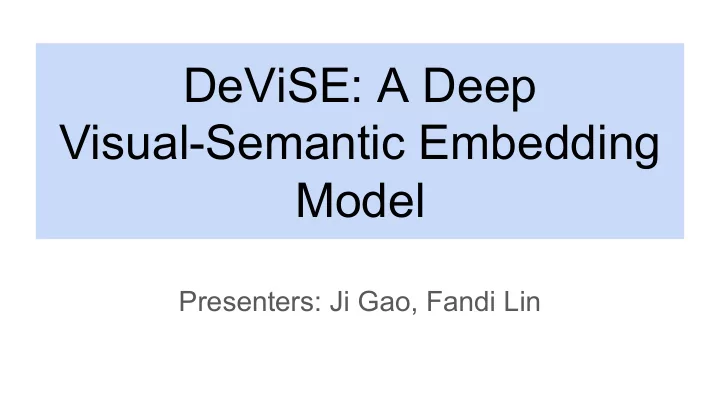

DeViSE: A Deep Visual-Semantic Embedding Model Presenters: Ji Gao, Fandi Lin
Motivation Visual recognition systems experience problems with large amount of categories. ● Insufficient labeled training data ● Blurred distinction between classes How do we improve predictions of unknown categories?
Background N-way discrete classifiers ● Labels treated as unrelated ● Semantic information not captured Result: These systems cannot make zero-shot predictions without additional information, i.e. text data.
Related Work WSABIE: Linear map from image features to embedding space. Only used training labels. Socher et al: Linear map from image features to embedding space. Outlier detection. Only 8 known and 2 unknown classes. Other work that has shown zero-shot classification relies on curated information.
Proposed Method Combine a traditional Visual model with a language model.
Proposed Method 1. Train a language model for semantic information 2. At the same time, train a CNN for images 3. Initialize the combined model using pre-trained parameters 4. Train the combined model
Skip-gram language model ● Efficient estimation of word representations in vector space, ICLR 2013 ● Skip-gram: a generalization of n -grams which skips the words between ● Skip-gram model: Learn a NN from a word to predict nearby words.
Skip-gram language model Learn the relationship between labels. ● Data: 5.7 million documents (5.4 billion words) extracted from wikipedia.org
CNN model ● AlexNet ● Winner of ILSVRC 2012 ● 5 conv layers
Combined model Use a linear embedding layer to map the features extracted before Softmax(4096d) to match the size of the language model(500 or 1000d). Loss function:
Experiment Task: ● Image classification ● Zero-shot image classification
Experiment - With same label set (not zero-shot) Baselines: ● Alexnet ● Random Embedding: Alexnet + a random vectors (instead of the language model)
Experiment: Zero-shot Dataset: ● 2-hop: two clusters of labels ● 3-hop: three clusters of labels ● ImageNet2011: Use labels in ImageNet2011 that doesn’t appear in ImageNet2012
Experiment: Zero-shot Comparing to pure CNN:
Experiment: Zero-shot Compare to previous zero-shot result
Conclusion DeViSE achieves state-of-the-art performance in classification task, and also able to do zero-shot learning. Suitable for large amount of data, and can handle labels with not enough number of data. Show the power of combining image and semantic data.
Recommend
More recommend